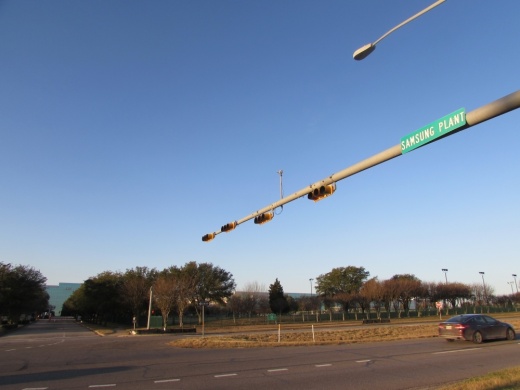Travis County commissioners will begin negotiations to draft an agreement with Samsung Austin Semiconductor, which seeks performance-based tax incentives to bring a $17 billion chip-making plant to the county.
The company, which already has a semiconductor facility in North Austin, submitted an application for Chapter 28 economic development incentives to Travis County on June 26, county staff said.
County commissioners first signified their intent to receive an application from Samsung—then under the guise of “Project Silicon Silver”—in January, after lifting a moratorium on Chapter 28, which had been in place for over a year while the county considered adjustments to the policy.
At the time, commissioners also adopted a new, temporary set of adjustments to the Chapter 28 policy, such as a mandated $15/hour base pay for workers associated with Silicon Silver, including construction workers hired to build the facility. They also adopted measures to improve public transparency on Chapter 28 proceedings, including holding at least two public hearings on any given agreement.
Christy Moffett, Travis County managing director for economic and strategic planning, said the next step is for county staff and commissioners to begin formal negotiations with Samsung and create a draft performance agreement, which would include studies measuring effects on local property taxes.
“We will work to do our best to move as quickly as possible, but at this point in time, I can't tell you exactly when that draft performance agreement would be available. It all depends on how negotiations go,” Moffett said.
Samsung, Moffett said, is hoping to finalize a performance agreement by mid-August. However, if Travis County follows its own rules regarding public transparency procedures, it will likely be unable to meet that deadline. According to the county’s Chapter 28 rules, a draft performance agreement must be posted publicly at least 7 days before the first public hearing is held. A second public hearing will be held following the publication of a revised draft performance agreement, around 14 days after the first public hearing.
“I think that's important for the public to know, and also for Samsung to know, and for people to understand that we feel strongly that these kinds of economic development agreements should be very public. That's why we adopted that timetable,” Commissioner Brigid Shea said.
Austin resident Zenobia Joseph called in during the meeting and encouraged Travis County to include bus routes heading toward the Samsung site in the performance agreement, possibly using funds allocated to local transportation projects from the American Rescue Plan Act. Austin bus routes have a history of creating transportation barriers for commuters, she said.
“I did meet a man named Kevin in 2019, a black man, who would walk to Lakeline Boulevard, get to North Lamar Transit Center, transfer to the 392, and then walk three miles to work,” Joseph said.
Travis County will consider Samsung's application in partnership with the city of Austin's Chapter 380 process, which authorizes municipalities to offer incentives to stimulate economic development.
Documents reviewed by Community Impact Newspaper in January showed Samsung had already rejected an offer from the city of Austin that included almost $650 million in incentives over five years. The company instead requested a 100% tax abatement over 25 years.
In addition to Travis County and Austin, Samsung has also submitted an application for economic incentives to Taylor ISD, a Williamson County school district. Texas Comptroller documents related to Samsung’s application to Taylor ISD show the company is also considering locations outside Texas, including sites in Arizona, New York and South Korea.






